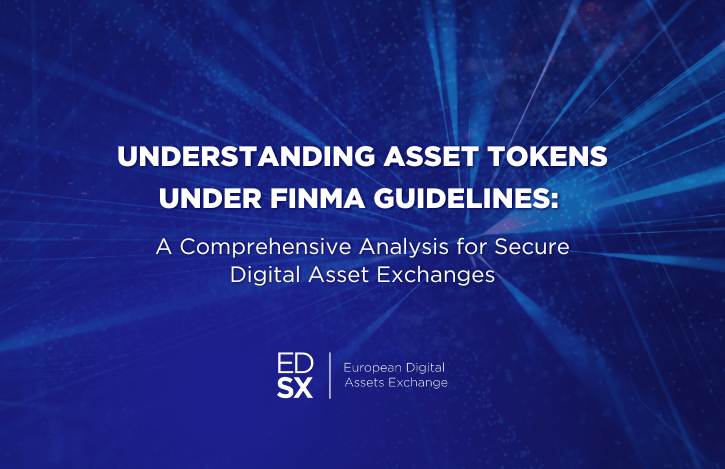In the rapidly evolving landscape of digital assets and blockchain technology, asset tokens have gained significant attention. As Switzerland emerges as a prominent hub for innovation in the financial markets, the Swiss Financial Market Supervisory Authority (FINMA) has published comprehensive guidelines that shed light on the treatment of asset tokens within the Swiss legal framework. This article aims to provide a comprehensive analysis of asset tokens as defined by FINMA, exploring their characteristics, regulatory implications, and their relevance for digital asset exchanges, particularly those dealing with Security Token Offerings (STOs).
The Rise of Asset Tokens in Switzerland
FINMA’s guidelines address the growing ICOs and provide regulatory clarity. Asset tokens, one of three categories, represent physical assets, companies, earnings, or entitlements to dividends or interest. They bear similarities to traditional financial instruments such as equities, bonds, or derivatives.
FINMA Classification: Asset Tokens
Asset tokens possess unique characteristics that distinguish them from other token types. They provide token holders with rights or economic interests in an underlying asset. These tokens may offer ownership rights, profit-sharing mechanisms, or entitlements to future cash flows. The transferability as well as the tradability of asset tokens are key factors that influence their regulatory treatment.
Under Swiss law, asset tokens fall within the scope of securities regulation. This means that the issuance, trading, and offering of asset tokens are subject to specific requirements outlined by FINMA. Compliance with securities law, as well as civil law obligations under the Swiss Code of Obligations, is mandatory for those dealing with asset tokens. Market participants must carefully navigate these regulations to ensure the protection of investors and the integrity of the financial system.
Securities Law Requirements and Civil Law Obligations
In accordance with securities regulations, asset tokens must meet certain criteria to ensure investor protection and market integrity. These requirements include the provision of comprehensive and reliable information to investors through prospectuses or offering documents. Disclosure of material information, such as the issuer’s financials, business model, and risk factors, is crucial to enable investors to make informed investment decisions.
In addition to securities law requirements, asset tokens are subject to civil law obligations defined by the Swiss Code of Obligations. These obligations may include the need for shareholder agreements, compliance with corporate governance principles, and adherence to dividend or interest payment obligations. Understanding and fulfilling these civil law requirements is vital for issuers as well as market participants operating in the asset token space.
Anti-Money Laundering (AML) Considerations
FINMA recognizes the high money laundering risks associated with decentralized blockchain-based systems, where assets can be transferred anonymously. Accordingly, AML regulations are crucial when dealing with asset tokens. Financial intermediaries, including digital asset exchanges, must implement rigorous Know Your Customer (KYC) and Anti-Money Laundering (AML) procedures to identify and verify the identity of token holders together with ensuring compliance with AML laws.
Implications for Digital Asset Exchanges
Digital asset exchanges play a pivotal role in facilitating the trading and exchange of asset tokens. Compliance with the regulatory framework set by FINMA is essential for the sustainable and secure operation of these exchanges. Robust security measures, transparent trading practices, and adherence to securities as well as AML regulations are critical factors that digital asset exchanges must prioritize to instill trust and confidence among market participants.
Security Token Offerings (STOs) have emerged as a regulated and compliant alternative to traditional fundraising methods. Asset tokens, being subject to securities regulation, offer an attractive avenue for conducting STOs. Tokenizing real-world assets and issuing asset tokens unlocks liquidity, broadens investor participation, and streamlines ownership transfer. Specialized STO exchanges offer regulated marketplaces, ensuring securities law compliance together with enabling secondary market trading.
Overall, with the publication of guidelines addressing asset tokens, FINMA has provided essential clarity to market participants operating within the Swiss digital asset ecosystem. Asset tokens, falling under securities regulation, bring new possibilities for digital asset exchanges and Security Token Offerings. Embracing FINMA’s framework empowers digital asset exchanges. It fosters confidence, enhances market integrity, together with contributes to sustainable development in Switzerland. Compliance with laws, obligations, and AML procedures secures a thriving exchange landscape.


Based in Zug, the platform is fully compliant with all Swiss laws related to financial intermediaries, banking, anti-money laundering, and organized trading facilities. Among its core values, there are innovative solutions through blockchain technology, which ensures security and liquidity.
EDSX is the first platform in Europe with primary and secondary markets for both institutional and retails. EDSX is a pioneering platform that employs the world’s leading technology to globally list security tokens in both primary and secondary markets, listing digital securities of real financial instruments to the public with a decentralized peer-to-peer exchange. Our goal is to fully engage every aspect of the financial revolution.
Do you have a question for us?
Send your query here:
[email protected]

